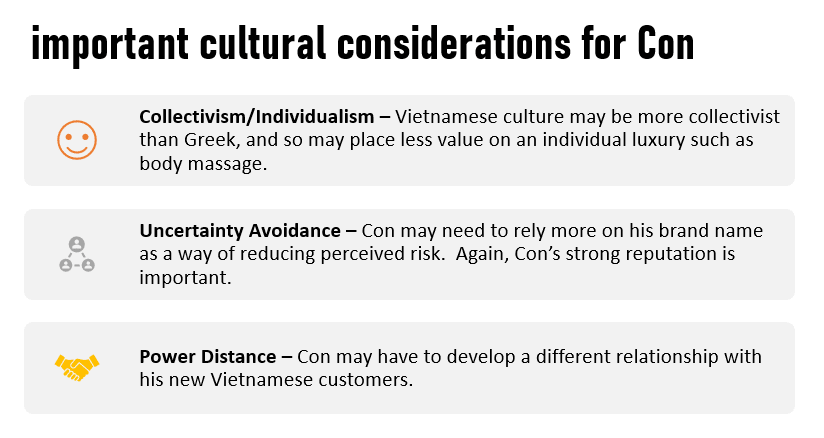This mini case focuses on the cultural differences in decision making in a service setting.
What might be important cultural considerations for Con to consider in thinking about this opportunity?
Con should compare the cultural characteristics of the Greeks (his primary market now) and the Vietnamese (his potential market) to see if there are any differences that would warrant him altering the production, marketing or delivery of his service.
The point should be made, however, that not all people in each society or culture possess the same values.
Collectivism/Individualism – Vietnamese culture may be more collectivist than Greek, and so may place less value on an individual luxury such as body massage. Balancing this, collectivists often rely on word of mouth, which has been strong for Con in the past.
Uncertainty Avoidance – Con may need to rely more on his brand name as a way of reducing perceived risk. Again, Con’s strong reputation is important.
Power Distance – Con may have to develop a different relationship with his new Vietnamese customers. Rather than a friendly, peer relationship, Con may be better served to treat his Vietnamese customers more formally (at least at first) and understand their perceptions of status.

What might be typical risk factors of concern to Con’s clients, and what would you recommend by way of dealing with them effectively?
Functional Risk
Con’s customers may be concerned that his massage services may not achieve the desired result, or that he is qualified to perform them. This may be alleviated by providing client testimonials from satisfied customers and by Con showing his massage credentials for new customers.
Financial Risk
Can be lightened by Con providing his customers with a fixed massage fee rather than charging an hourly fee.
Temporal Risk
With Con travelling to people’s homes, most temporal risk has already been controlled. Con may want to let customers know that if he is running late, he will call them as soon as he can.
Psychological Risk
There may be a risk of customers feeling uneasy about Con entering their homes. Con may want to have an alternative venue until customers feel comfortable about this situation, or alternately, Con can advise his clients that other family members or friends are welcome to sit in while the massage is in progress.
Social Risk
Customers may believe that others will not approve of getting a massage in their homes. Con may promote the health and functional benefits of massage, rather than the hedonic benefits.
Sensory Risk
Again, since Con is predominantly working from customer’s homes, he is taking most of the sensory risk. He should be very aware, however, of sensory risk factors under his control such as bad breath, body ordor and professional appearance.
What other behavioral considerations are likely to be important in providing this service, and why?
Con needs to evaluate the mood of his customers. Customers in a positive mood are likely to be less argumentative and easier to serve. Moods are also known to enhance experiences, making them more positive or negative than they might otherwise be perceived.
Con also needs to be aware that his own mood can affect the level of service he provides.

